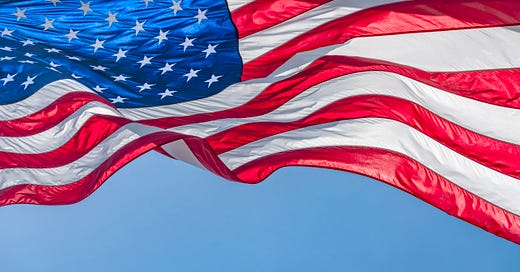On this Fourth of July, the day on which citizens of the United States celebrate the signing of our Declaration of Independence, let us remind ourselves of some of what America1 stands for.
We the People of the United States, in Order to form a more perfect Union, establish Justice, insure domestic Tranquility, provide for the common defence, promote the general Welfare, and secure the Blessings of Liberty to ourselves and our Posterity, do ordain and establish this Constitution for the United States of America.
- the preamble of the Constitution, written in 1787
We, the founders asserted, have “certain unalienable Rights,” among which are “Life, Liberty, and the pursuit of Happiness”2.
We have the right to not be enslaved3, and to equal protection under the law4.
We have the right to vote, regardless of “race, color, or previous condition of servitude”5. We have the right to vote if we are women6. We have the right to vote even if we haven’t paid our taxes7. And we have the right to vote if we are 18 – 20 years of age8.
We have the right to keep and bear arms9.
We have the right to be “secure in [our] persons, houses, papers, and effects, against unreasonable searches and seizures”10. When accused of a crime, we have the right to a “speedy and public trial”11, and, if found guilty, we have the right to have no “cruel and unusual punishments inflicted” on us12.
We have the rights named in the First Amendment to the Constitution:
Congress shall make no law respecting an establishment of religion, or prohibiting the free exercise thereof; or abridging the freedom of speech, or of the press; or the right of the people peaceably to assemble, and to petition the Government for a redress of grievances.
If religion is understood—as it often has been13—to refer, sensu lato, to those private philosophies that one holds, rather than, sensu stricto, only to explicitly theological or formal belief systems, then the First Amendment recognizes freedom to think.
The First Amendment recognizes freedom to think; freedom to speak; freedom to share one’s thoughts more broadly than among a circle of intimates—as in the press; freedom to congregate; and freedom to bring to the government one’s concerns, and to not be punished for doing so.
Furthermore, we have the right to all of the rights not enumerated in any of our official documents14. The default assumption in this country is, therefore, quite explicitly, that we have rights, not that we do not have them.
The default assumption is that we are free.
Today, the United States celebrates 247 years of existence. We have made mistakes, to be sure—assigning partial personhood to large swaths of people; taking our time in outlawing slavery, and in awarding the vote to all adult citizens; outlawing the manufacture, sale and transport of alcohol. These are just a few that show up in our most foundational documents. But we have corrected many of our mistakes, and learned from them. May we continue to do so.
In three short years, we will have existed for one quarter of a millennium. Can we hold on for much longer? If you are one of those who would disdain the American experiment, what would you have in its place?
I am using the shorthand “America” to refer to the United States of America. I do so with recognition that there are 22 nation states in the Americas (35 if we include island nations), and that citizens of those nations that are not the U.S.A. would point out, accurately, that they, too, are Americans. In turn, I include this footnote in full recognition that some will accuse me of pandering to sensitivities on the left. This is not pandering. Beginning in the early 1990s, when I first traveled in Central America, I was occasionally corrected by good and honorable people who said—"yes, you are an American, but so am I.”
The Declaration of Independence, July 4, 1776
13th Amendment, 1865
14th Amendment, 1868
15th Amendment, 1870
19th Amendment, 1920
24th Amendment, 1964
26th Amendment, 1971
2nd Amendment to the Constitution. The first Ten Amendments to the Constitution, collectively known as the Bill of Rights, were all ratified on December 15, 1791.
4th Amendment
6th Amendment
8th Amendment
See, e.g. Clements 1988. Defining religion in the First Amendment: A functional approach. Cornell Law Review 74(3): 532 – 558.
9th Amendment





Thank you for this. I also wanted to say that I watched episode 179 of darkhorse and saw your genuine pain of realization. I have been in the vaccine skeptic space for over a decade following a serious injury of a family member but I remember the horror when I started educating myself. Deep bow to your honesty
Thank you so much for sharing this wonderful sentiment. I wish you and Bret and family a happy and safe July 4th!